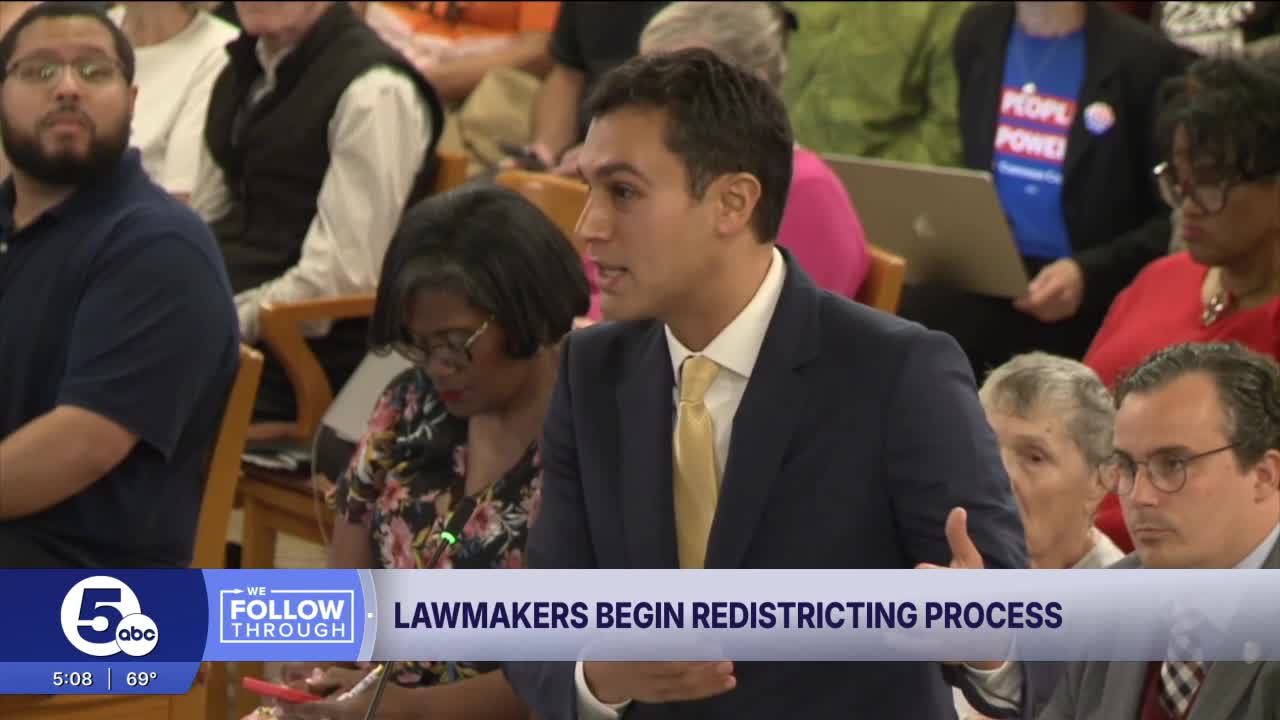COLUMBUS, Ohio — Ohio Republicans and Democrats sparred during the state's first congressional redistricting hearing, arguing that the other was the one truly gerrymandering.
"You have to draw the line somewhere," House Minority Leader Dani Isaacsohn (D-Cincinnati) said during testimony.
Those are literal lines, the lines for Ohio's delegation of U.S. House representatives.
"When districts are gerrymandered, our voices are excluded in the process," said Reverend Dr. Aileen Maddox, a Dayton resident.
Ohio's mapmaking process has begun, with Maddox driving over an hour to testify at the first Joint Committee on Congressional Redistricting meeting on Monday.
"The whole idea... whether Democrat or Republican, that we have leadership that hears us, that feels accountable to us," Maddox said.
But those leaders are already sparring, with state Sen. Bill DeMora (D-Columbus) calling the hearing a "dog and pony show," and Committee Chair Jane Timken (R-Jackson Township) said that the Democrats had been using "over the top hyperbolic comments."
Isaacsohn submitted the Democrats' map Monday, one that he says is fair.
RELATED: Democrats propose map reducing Ohio's GOP congressional seats. Republicans call it a 'fantasy.'
"When we have competitive districts, voters get to choose their candidates," Isaacsohn testified.
Currently, there are 10 Republicans and five Democrats representing Ohio in the U.S. House. President Donald Trump won Ohio 55-44% in 2024. With that result, Ohio's 15 congressional districts would be eight Republican and seven Democratic, which is reflected in the Democrats' map.
But Republicans on the committee, like state Rep. Brian Stewart (R-Ashville), say that the proposed map is unconstitutional.
"It seems to be it's only gerrymandering when Republicans win," Stewart said to Isaacsohn. "How on earth is this not gerrymandering when you're artificially drawing lines so that you can win more seats?"
"We have seven leaning Democratic districts," DeMora said.
DeMora explained that at least three of those are within a percentage or two.
"Those are true swing districts," DeMora said.
Republicans haven't introduced their own map yet, but party leaders say they want at least 12 districts to lean red.
RELATED: Ohio House Speaker says he won’t let Trump pressure him during redistricting process
This would be absolute gerrymandering and not representative of the voter makeup of the state, Isaacsohn said.
Timken said voters chose to have the GOP supermajority, controlling every aspect of this process.
"From 2016, we've had 23 statewide races," Timken said. "Democrats have won one."
Each Ohioan who testified publicly Monday opposed the current maps or supported the Democrats' maps.
"We should not have to fight a system that is rigged against us before we even cast a vote," Maddox said.
By law, legislators must pass a bipartisan map by the end of September. However, Committee Chair Adam Bird (R-New Richmond) stated there wasn't a "constitutional deadline." He later seemed to correct that he meant there is another process that takes over if the lawmakers fail by the end of September.
Deadlines and process
Sept. 30: The lawmakers need to pass a map with at least 60% in each chamber with at least 50% support of Democrats.
If that fails, it goes to the ORC.
Oct. 31: To meet this deadline, at least four members of the ORC, including two Republicans and two Democrats, must approve.
If that fails, it goes back to the legislature.
Nov. 30: This map can also pass with just a simple majority, and the map must be replaced after six years.
What's next?
The GOP leaders said they will be scheduling another hearing for next week.
"When it comes down to it, do you really care about getting the Democrats on this? You don't need them," I asked the Republicans.
"I would speak that we're challenged to pass a bipartisan map by the end of September — obviously, that's not going to happen, but that doesn't mean we're not going to continue to work, talk, listen to Ohioans, work with the Democratic Party, and I think that we want to work with everyone," Bird responded.
Democrats feel that Republicans will do what they want to do, regardless, DeMora said.
Follow WEWS statehouse reporter Morgan Trau on Twitter and Facebook.






